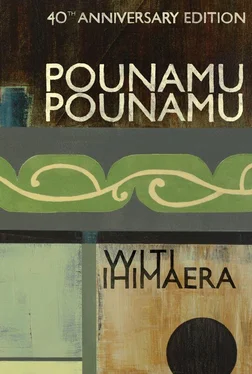This kaumatua, his eyes dim. In this falling afternoon he has come to visit the meeting house for the last time. He knows it is the last time. Just as the sun falls and the shadows lengthen within the meeting house, so too is his life closing. Soon his photograph will be placed along the wall with those of his other friends, relations and tipuna — his ancestors.
This village has always been a proud place, ringing with joy. Its people are a proud people, a family. One great family, clustered around this meeting house. Ae, they quarrelled sometimes, but it is only the happiness that this old one remembers.
However, over the years, people have begun to leave in search of a new life. Many of the houses lie deserted. The fields are choked with weeds. The gorse creeps over the graveyard. And the sound of children laughing grows smaller each year.
That is the most heartbreaking thing of all. Once the manawa, the heart, throbbed with life and the whanau gave it life. But over the years more and more of its children left and the family began to break apart. Of those that went few returned. And the heartbeat is weaker now.
He sighs again, this kaumatua. He would like to stay but he has reached the end of his years. His people they will weep for him. Hera, his niece, she will cry very much. But in the end, she will remember.
‘Hera, don’t you be too sad when I’m gone. If you are, you come to this meeting house. I’ll be here, Hera. You come and share your aroha with me. You talk to me; I will listen.’
He’d told her that when she was a little girl. Even then the world had been changing. Hera, she’d been one of the few of his mokopuna who’d been interested in the Maori of the past. The rest, they’d felt the pull of the Pakeha world, like fish too eager to grab at a dangling hook. In Hera he had seen the spark, the hope that she might retain her Maoritanga. And he had taught her all he knew.
‘Hera, this is not only a meeting house; it is also the body of a tipuna, an ancestor. The head is at the top of the meeting house, above the entrance. That is called the koruru. His arms are the maihi, the boards sloping down from the koruru to form the roof. See the tahuhu, ridgepole? That long beam running from the front to the back along the roof? That is the backbone. The rafters, the heke, they are the ribs. And where we are standing, this is the heart of the house. Can you hear it beating?’
And Hera, she had listened and heard. She had clutched him, afraid.
‘Koro! The meeting house, it lives!’
‘The meeting house, it won’t hurt you, Hera,’ he had told her. ‘You are one of its children. Turi turi now.’
And he had lifted the veils from the photographs of all her family dead and told her about them.
‘That’s your Nani Whiti. He was a brave man. This is my Auntie Hiria, she was very beautiful, eh? She’s your auntie too. This man, he was a great rangatira.’
Later, they had sat in the middle of the meeting house, he on a chair, she sitting on the floor next to him, and he had told her its history.
‘This meeting house, it is like a book, Hera. All the carvings, they are the pages telling the story of this whanau. The Pakeha, he says they’re legends. But for me they are history.’
And page by page, panel by panel, he had recounted the history.
‘That is Pou, coming from Hawaiki on the back of a giant bird. He brought the kumara to Aotearoa. This is Paikea, riding a whale across the sea to Aotearoa. He was told not to let the whale touch the land. But he was tired after the long journey, and he made the whale come to shore. It touched the sand, and became an island. You can still see it, near Whangara. See the tukutuku work on the walls? All those weavings, they represent the stars and the sky.’
And Hera, her eyes had glistened with excitement.
‘Really, Koro, really?’
‘Ae, Hera. You remember.’
This old one, he closes his eyes to keep the memories away because inevitably, as had happened with all the others, even Hera had gone away to the city. And when she had returned for a visit, this old one could see that she was finding it difficult to reconcile the Maori way with the Pakeha way. He had tried to lead her back to his world, and she had quarrelled with him.
‘Don’t, Koro! The world isn’t Maori any more. But it’s the world I have to live in. I know you want me to stay. But I can’t.’
But he had been stubborn, this kaumatua. He’d always been stubborn. If she would not come back to his world, then she would take it to the city with her.
‘Come, Hera, I want to show you something.’
‘No, Koro.’
‘These books, in them is your whakapapa, your ancestry. All these names, they are your family who lived long ago, traced back to the Horouta canoe. You take them with you when you go back.’
‘Koro.’
‘No, you take them. And see this space? You put my name there when I die. You do that for me. You keep this whakapapa safe. And don’t you ever forget who you are. You’re Maori, understand? You are Maori.’
His voice had been fierce and passionate, his words ringing with conviction. And Hera had embraced him and he felt her own strength.
‘I understand Koro,’ she had whispered. ‘You taught me too well to be Maori. But you didn’t teach me about the Pakeha world.’
He opens his eyes, this old one, but he still hears his Hera’s whisper. Ae, he had taught her well. And one day her confusion would pass and she would find her way back. How? Through following the pathway of whakapapa and, through her journey, she would realise that belonging, being Maori, was truly what mattered. That’s why he had taught her well. That’s why.
For a moment he smiles to himself, this old one. Then he recalls an ancient saying. How old it is he does not know. Perhaps it had come with the Maori when he journeyed across the sea to Aotearoa. From Hawaiki. From Tawhiti-roa, Tawhiti-nui, Tawhiti-pamamao, the magical names for the first home of the Maori. No matter. Even before the Pakeha had come to this land, his coming had been foretold.
Kei muri i te awe kapara he tangata ke,
mana te ao, he ma.
Shadowed behind the tattooed face a stranger stands,
he who owns the earth, and he is white.
And with his coming, the tattooed face had changed. That was the way of things, relentless and unalterable. But the fighting spirit of the Maori, did that need to change as well? Ae, even in his own day, Maoritanga had been dying. But not the fighting spirit, not the joy or aroha.
He cannot help it, this kaumatua, but the anger rises within him.
The Maori language has almost gone from this whanau. The respect for Maori customs and Maori tapu, that too was disappearing. No more did people take their shoes off before coming into this meeting house. The floor is scuffed with shoe-marks. The tukutuku work is pitted with cigarette burns. And even the gods and tipuna, they have been defaced. A name has been chipped into a carved panel. Another panel bears a deep scratch. And a paua eye has been prised from a carved figure, a wheku.
This meeting house, it had once been noble. Now, the red ochre is peeling from the carvings. The reed work is falling apart. The paint is flaking from the swirling kowhaiwhai designs. And the floor is stained with the pirau, the beer, for even that has been brought into this meeting house.
And the young, not understanding custom, do not come to this meeting house with respect, nor with aroha. They look with blind eyes at the carvings and do not see the beauty and strength of spirit which is etched in every whorl, every bold and sweeping spiral. They too are the strangers behind the tattooed face.
Is it their fault? this old one wonders. Is it their fault that so many families had to leave in search of work? That the younger generation grow up not knowing their papakainga? He has seen too many of his people come as strangers. The Maori of this time is different from the Maori of his own time. The whanau, the family, and the aroha which binds them together as one heart, is breaking, slowly loosening. The children of the whanau seek different ways to walk in this world. Before, there was a sharing of aroha with one another. No matter how far away some of the children went there was still the aroha which bound them closely to this meeting house and village. But the links are breaking. The young grow apart from each other. They walk away and do not come back. That is why the old one’s heart beats so loud with anger. The language, the customs, the knowledge — matauranga Maori — must be brought back.
Читать дальше












